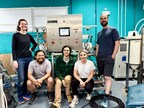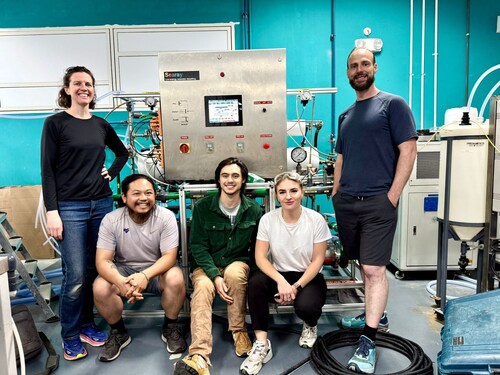Consortium team includes Harmony Desalting, Purdue University, and Bochum University of Applied Sciences. Qualified testing using batch reverse osmosis commences in October.
BOSTON, Sept. 24, 2025 /PRNewswire-PRWeb/ -- XPRIZE Water Scarcity is a $119 million, multi-year prize designed to drive widespread access to clean water by creating reliable, sustainable, and affordable seawater desalination systems. Renaissance Water is pleased to announce that our team has qualified for both Track A (System-Level Innovation) and Track B (Novel Materials and Methods) of the competition.
WATER ALWAYS, FOR ALL: Today, desalination serves less than 10% of the global population (as calculated from a total global desalination capacity of 100,000,000 m3/day and a per capita water consumption of 150 liters/day). This approach is clearly insufficient: 80% of the population suffers from serious water threats to their water scarcity. Desalination must be improved to make a meaningful impact on tomorrow's water challenges.
"We developed the first Batch Reverse Osmosis concept over ten years ago, while we were PhD students at MIT, by asking a simple question: how can we eliminate the largest thermodynamic inefficiencies of reverse osmosis?"
– David Warsinger, Associate Professor of Mechanical Engineering, Purdue University
THE FUTURE IS DYNAMIC: Regular reverse osmosis (RO) suffers from biofouling, poor flexibility, and limitations on the water recovery rate. A key limitation of regular RO is that it must operate at constant pressure. Harmony Desalting's batch RO process unlocks variable pressure operation and offers the best possible energy-efficiency combined with reduced membrane fouling. Through Track A Qualified Testing, Renaissance Water will demonstrate batch RO's performance at 5 m3/day without any need for energy recovery.
"I was met with great skepticism when I first presented my results on operating a membrane element under ultra-high pressure in 2017. Today, it is evident: sustainable resource management and circular approaches require extraordinary conditions. To boost recoveries, we must push process boundaries and rethink element design."
– Prof. Christine Kleffner, Co-founder & CTO, Harmony Desalting
TOWARDS NEW FRONTIERS: At 40-50% water recovery, today's SWRO plants produce more brine than product! We envision a future where desalination plants recover at least 67% water: twice as much product as brine. This improvement would shrink the feed intake, pretreatment, and brine disposal needs of a desalination plant. Realizing this vision requires extending membrane operations beyond the conventional limit of 80 bar (1200 psi). As conditions evolve, so do the demands on the membrane element: a key component consisting of interacting parts that must be aligned and tuned to the application to unleash full process performance. For Track B, Renaissance Water will tailor membrane elements to high-pressure batch operations.
LET'S MAKE WATER: Our approach is to team up with other innovators as appropriate to deliver a more reliable and accessible desalination solution. Together we will decrease the cost of full-scale seawater desalination and enable the proliferation of off-grid, decentralized desalination units.
Media Contact
Quantum Wei, Team Renaissance Water, 1 7033711677, [email protected], renaissancewater.com
SOURCE Renaissance Water



Share this article